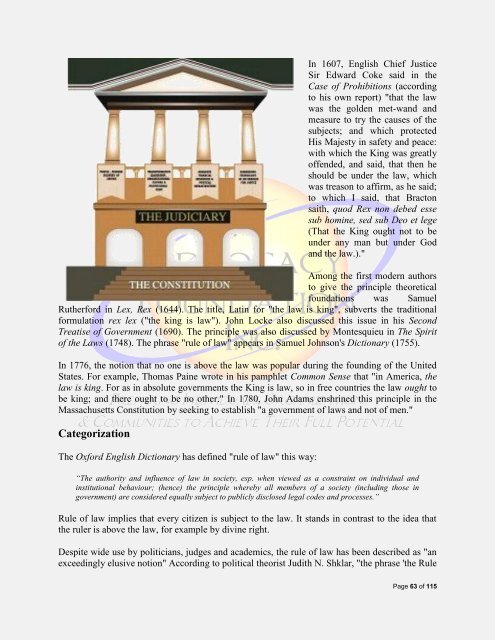Judicial ReEngineering
Judicial ReEngineering
Judicial ReEngineering
You also want an ePaper? Increase the reach of your titles
YUMPU automatically turns print PDFs into web optimized ePapers that Google loves.
In 1607, English Chief Justice<br />
Sir Edward Coke said in the<br />
Case of Prohibitions (according<br />
to his own report) "that the law<br />
was the golden met-wand and<br />
measure to try the causes of the<br />
subjects; and which protected<br />
His Majesty in safety and peace:<br />
with which the King was greatly<br />
offended, and said, that then he<br />
should be under the law, which<br />
was treason to affirm, as he said;<br />
to which I said, that Bracton<br />
saith, quod Rex non debed esse<br />
sub homine, sed sub Deo et lege<br />
(That the King ought not to be<br />
under any man but under God<br />
and the law.)."<br />
Among the first modern authors<br />
to give the principle theoretical<br />
foundations was Samuel<br />
Rutherford in Lex, Rex (1644). The title, Latin for "the law is king", subverts the traditional<br />
formulation rex lex ("the king is law"). John Locke also discussed this issue in his Second<br />
Treatise of Government (1690). The principle was also discussed by Montesquieu in The Spirit<br />
of the Laws (1748). The phrase "rule of law" appears in Samuel Johnson's Dictionary (1755).<br />
In 1776, the notion that no one is above the law was popular during the founding of the United<br />
States. For example, Thomas Paine wrote in his pamphlet Common Sense that "in America, the<br />
law is king. For as in absolute governments the King is law, so in free countries the law ought to<br />
be king; and there ought to be no other." In 1780, John Adams enshrined this principle in the<br />
Massachusetts Constitution by seeking to establish "a government of laws and not of men."<br />
Categorization<br />
The Oxford English Dictionary has defined "rule of law" this way:<br />
“The authority and influence of law in society, esp. when viewed as a constraint on individual and<br />
institutional behaviour; (hence) the principle whereby all members of a society (including those in<br />
government) are considered equally subject to publicly disclosed legal codes and processes.”<br />
Rule of law implies that every citizen is subject to the law. It stands in contrast to the idea that<br />
the ruler is above the law, for example by divine right.<br />
Despite wide use by politicians, judges and academics, the rule of law has been described as "an<br />
exceedingly elusive notion" According to political theorist Judith N. Shklar, "the phrase 'the Rule<br />
Page 63 of 115

















